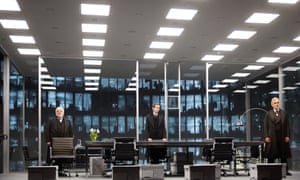From the advance publicity, the three and a half hours length seemed slightly daunting. In reality though the play was so fascinating at well performed that its length proved ideal - there were two intermissions.
The Guardian newspaper had am excellent review of the play when it was at the National Theatre with which I entirely agree:
What an astonishing evening! Spanning 150 years and running three and a half hours, Stefano Massini’s play traces the trajectory of western capitalism by following the fortunes of a single family. But where previous European stagings have deployed a vast cast, Sam Mendes’s production of Ben Power’s adaptation uses just three actors: Simon Russell Beale, Ben Miles and Adam Godley. The result is an intimate epic that becomes a masterly study of acting as well as of the intricacies of high finance.
For most of us, the name Lehman Brothers stirs memories of the financial crash of 2008, when this Wall Street institution filed for bankruptcy: an event with global consequences. But Massini’s play traces the family’s progress from the arrival of three brothers from Bavaria in the America of the 1840s. Starting modestly with the opening of a general store in Montgomery, Alabama, they move into buying and reselling raw cotton and expand into banking, coffee and the burgeoning railway business.
Power passes from one generation to the next, but there is a decisive shift in the late 1960s with the creation of a trading division run by non-family members. Eventually it leads to the firm’s demise with the collapse of the mortgage bond market.
You can see the story in many ways: as a dynastic drama, as a study of the decline and fall of an immigrant Jewish family, as a parable about the dangers of market deregulation.
But, although Power’s adaptation studiously avoids giving us any lectures, it is hard not to see the play as an account of the shifting definition of the American dream. To the original Lehman brothers, arriving in what one of them dubs “that magical music box called America”, it meant that enterprise and hard work would be rewarded by success. By 2008, it had dwindled into delusions of infinite riches based on financial services.

No comments:
Post a Comment